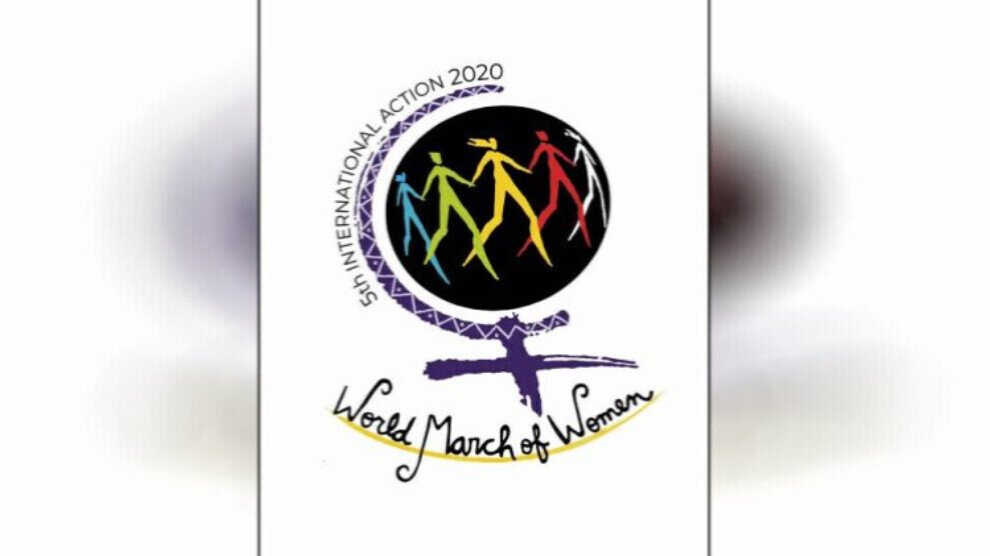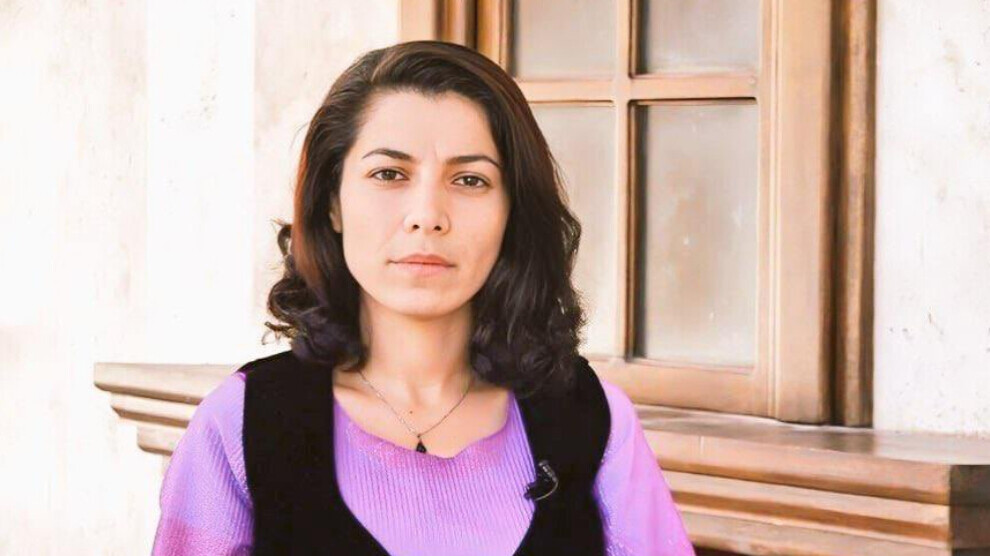The North Africa and Middle East region of the World March of Women said that the escalation of oppression in Iran and Kurdistan is a desperate attempt to silence women's voices and break their free will in their struggle for freedom and dignity.

ANF
NEWS DESK
Sunday, 17 November 2024, 17:43
Kurdish activist Warisha Moradi, a member of the Eastern Kurdistan Free Women's Community (KJAR), has been in Iranian custody since August last year and is currently being held in the women's section of Tehran's notorious Evin Prison. Last week, she was sentenced to death by a court for ‘armed rebellion against the state’. The reason given for the sentence is the 38-year-old Kurdish woman's membership of KJAR, the umbrella organisation of the Kurdish women's movement in East Kurdistan and Iran. Moradi's lawyers have appealed against the death sentence.
The North Africa and Middle East Region of the Global Women's March issued a statement condemning the death sentence against the Kurdish activist, which includes the following:
“In many countries around the world, women suffer from organized violence systematically implemented by authoritarian regimes striving to consolidate power by silencing free voices and crushing the popular will. Violence against women in these countries is not merely a tool of oppression; it is a policy of intimidation aimed at stifling demands for freedom and justice and breaking the resolve of those aspiring toward change.
The North Africa and Middle East region of the World March of Women strongly condemns the unjust death sentence issued against Kurdish activist Warisha Moradi, who has been subjected to the most severe forms of psychological and physical torture since her arrest in August 2023 by the Iranian regime after participating in the “Woman, Life, Freedom” uprising. Warisha’s case is not an isolated issue; it is part of a systematic campaign targeting women who resist oppressive regimes. This death sentence is a manifestation of the genocide targeting women activists who seek justice and equality.
To remind, Warisha Moradi is a brave feminist activist in the field of defending women's rights, which Iran considers a threat to its oppressive Islamic regime.
The escalation of oppression in Iran and Kurdistan is a desperate attempt to silence women's voices and break their free will in their struggle for freedom and dignity, by solidifying unjust systems that manifest in intimidating women and destroying their hopes for a better future. Through the trials of Warisha Moradi, Bekhsan Azizi, Sharifa Mohammadi, and other courageous activists, a message of intimidation is being sent to every woman who stands against repression and seeks freedom.
We, the North Africa and Middle East region of the World March of Women, affirm the necessity of mobilizing movements supporting rights and freedoms worldwide to hold the Iranian regime accountable for its ongoing human rights violations and support our legitimate demand to revoke these unjust death sentences against detained activists and stop systematic violence against them.
We also call on all human rights and women’s organizations worldwide to escalate pressure for the immediate release of all detained women in Iran and Kurdistan and to end all forms of persecution against them.
We believe that women's struggle is the foundation for achieving radical change and that women's liberation is the key to building free and just societies where human rights are respected and individual dignity is safeguarded.
Women’s role worldwide, especially in Iran and Kurdistan, is essential in humanity’s struggle for liberation from oppressive regimes. They bravely resist injustice and confront attempts to silence their voices and destroy their will.
In this historic moment, which witnessed the emergence of the "Woman, Life, Freedom" revolution in Kurdistan and Iran, we reaffirm that we will not retreat from our support for resisting women everywhere. We will not allow any repressive regime to silence their voices or crush their spirit. We will continue to fight for their right to live in freedom and dignity and will not stop until justice prevails and oppression is lifted from women.
In this context, we draw attention with concern and condemnation to the brutal violence faced by women in conflict and occupation zones in North Africa and the Middle East, where the lives of innocent women and children are destroyed, paying a heavy price under oppression and ruin. In places like Palestine, Yemen, Sudan, Lebanon, as well as Libya and Afghanistan, the worst violations are committed against women, with their lives and rights continually targeted through barbaric and repressive methods aimed at crushing their will and breaking their aspirations for a free and dignified life.
We, the North Africa and Middle East region of the World March of Women, denounce these policies that manipulate the fate of women and children, making them fuel for wars and conflicts. We will continue to struggle to stop these crimes, protect women's rights, and stand against anyone who seeks to extinguish the voice of free women.”
Lawyers of Warisha Moradi notified of the death sentence
The Kurdistan Human Rights Network announced that the death sentence of Warisha Moradi, whose hearings were held on 16 June and 5 October 2024, was notified to her lawyers on Sunday.

ANF
NEWS DESK
Monday, 11 November 2024
Political prisoner Warisha Moradi, a member of the Rojhilat Free Women's Community (KJAR), was sentenced to death by the 15th Branch of the Tehran Islamic Revolutionary Court on charges of "treason." According to the Kurdistan Human Rights Network, Moradi’s lawyers were notified on Sunday of the death sentence handed over to her client. The hearings for the trial were held on 16 June and 5 October 2024. Judge Abolqasem Salavati, who presided over the court, did not allow Moradi to defend herself during the hearings. He did not even allow her lawyers to defend her. In addition, the lawyers, who were previously denied the right to review the case, were only able to review their client's case for a few hours after the end of the second hearing.
Warisha Moradi (alternative spelling Varishe or Warisheh), also known as Ciwana Sine, was arrested on 1 August 2023 during a police check near her hometown of Sine (Sanandaj) and was initially the victim of a forced disappearance. The Kurdish woman is a member of the "Community of Free Women of Rojhilat" (KJAR), the umbrella organization of the Kurdish women's movement in East Kurdistan and Iran, and was committed to women's and feminist issues. Iran's regime judiciary sees the KJAR as a "separatist terrorist organization" because it is part of the Free Life in Kurdistan Party (PJAK). The PJAK resists the oppression and discrimination of the Kurdish people and advocates for women's liberation, autonomy and democracy in Iran.
Brutally tortured, abused and interrogated
After Moradi's abduction, her whereabouts were unclear for months. It was only through research by the French-based human rights organization Kurdistan Human Rights Network (KHRN) that it became known that the activist had been brutally tortured, mistreated and interrogated by the Iranian Secret Service in Sine for weeks after her arrest, until she was transferred to Tehran at the end of August last year. There she was held for months in the notorious high-security wing 209 of Evin prison - also subjected to torture and mistreatment, with the aim of breaking her or forcing her to confess. Moradi has been in the women's section of the prison since the beginning of January. She has been denied access to legal counsel for most of the time. The KHRN and other human rights groups described the trial against the activist as grossly unfair. It lasted only a few minutes; Moradi was not allowed to defend herself and her lawyers were not given access to the files. On hunger strike against the death penalty
In October, Warisha Moradi went on a hunger strike lasting almost three weeks to protest against the inhumane conditions in the Iranian regime's prisons and the death penalty. Only after numerous appeals from the KJAR as well as NGOs and civil rights activists, women's rights activists and other human rights defenders did she end the action. During the hunger strike, the 38-year-old's condition was at times life-threatening due to her already poor health and the torture she had suffered in custody. According to KJAR, she could have collapsed, fallen into a coma or died at any time. Her lawyers have announced that they will take action against the death sentence against Warisha Moradi and force an appeal.

No comments:
Post a Comment